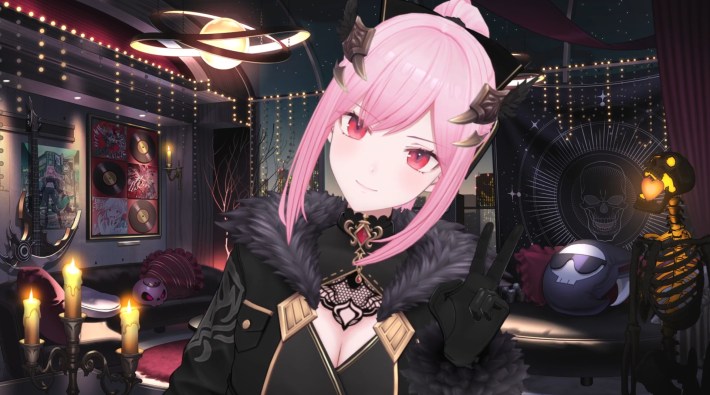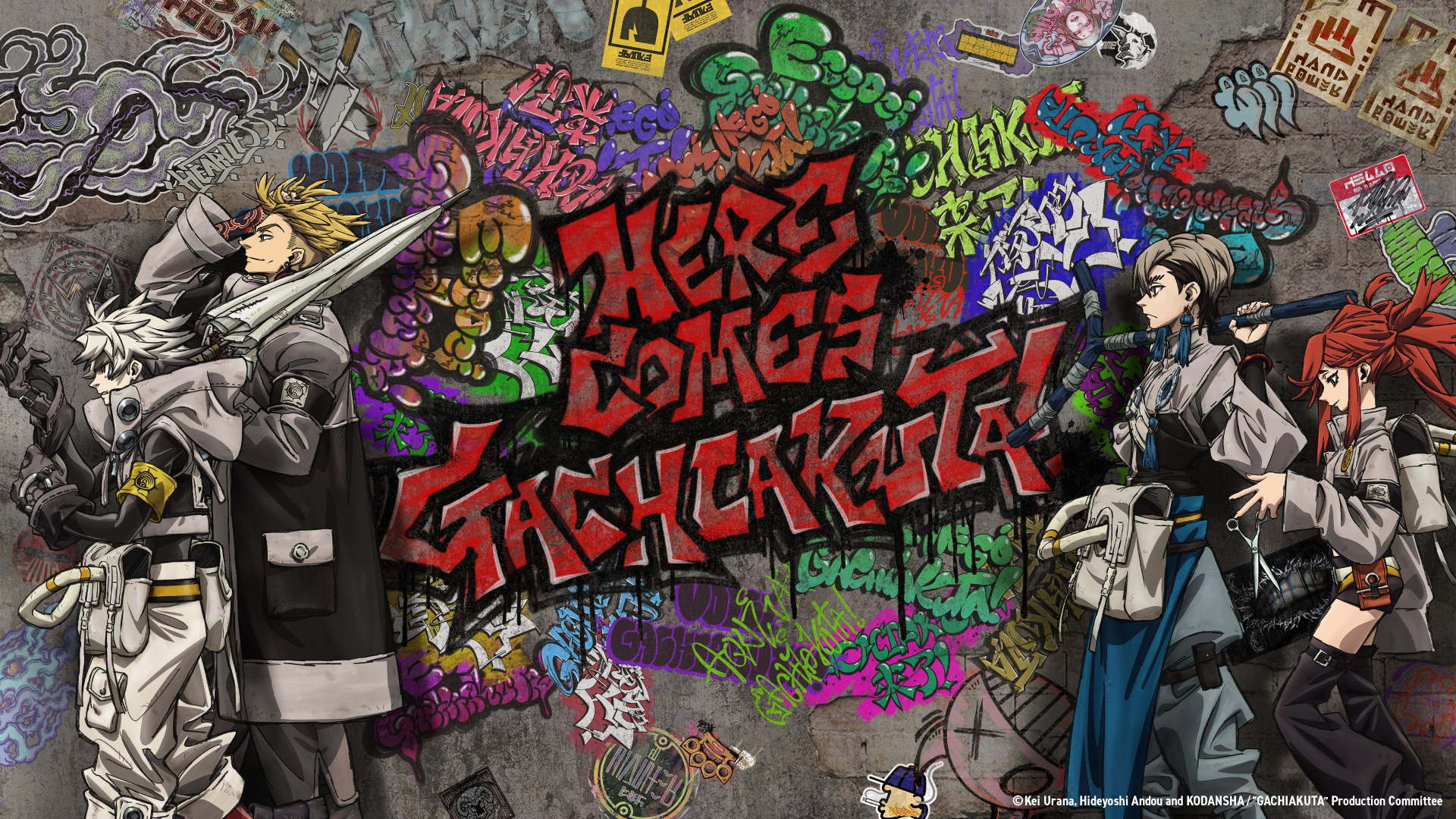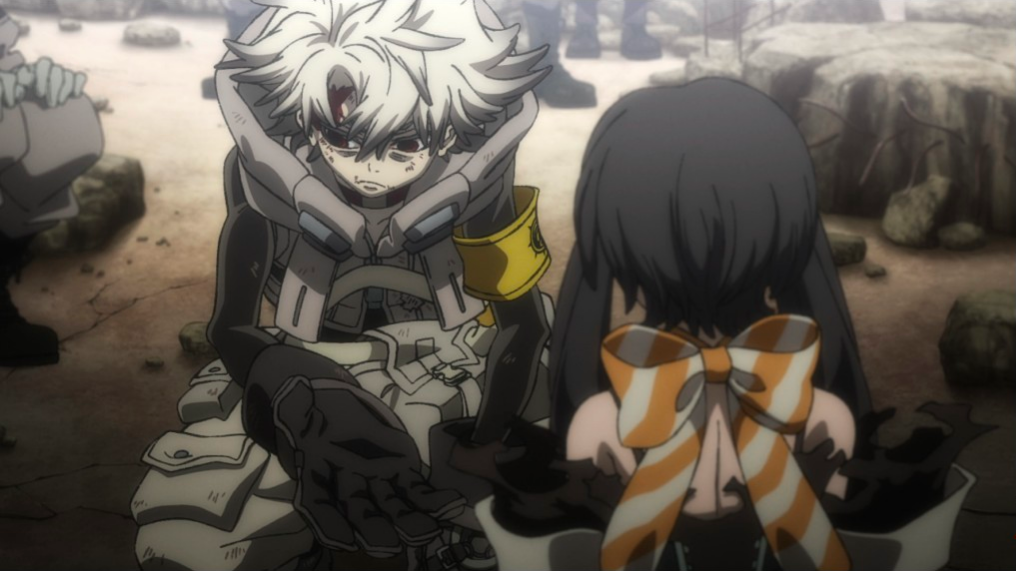In anime, an opening theme isn’t just a vibe—it’s a thesis statement. Before a single line of dialogue hits viewers' ears, that song sets a tone, teases an emotional arc, and lets fans know whether a show is gonna punch them in the gut or kick their heart in its ass. Basically, a good OP is a part of an anime’s holy trinity: art style, voice cast, and theme song. When it slaps, you don’t skip it; you sing along with it week in and week out.
So when Gachiakuta, the trashpunk shonen anime from Bones Film (of My Hero Academia fame), needed a new theme to match its explosive second cour, it wasn’t just about finding any fairweather musician to do the job. It needed someone who gets it. Someone who’s lived and breathed anime and knows what makes it work. Enter Mori Calliope.
Mori Calliope isn’t just a megapopular VTuber with 2 million subscribers and a discography that goes hard—she’s also a diehard Gachiakuta manga fan who’s lowkey been fiending for this kind of opportunity. She’s a part of the crowd who liked it before its anime adaptation made it mainstream. Her upcoming Gachiakuta theme song, “Let’s Just Crash,” aims to be a sonic embodiment of Gachiakuta’s volatile rage and righteous fury, mirroring Rudo’s descent into The Pit and his fight to reclaim justice.
In our chat, Mori Calliope broke down how “Let’s Just Crash” channels Rudo’s ongoing journey as the anime’s hero, how VTubbing let her cross the line from fan to creator, and how she hopes this collab will be the first of many to come as anime and VTubbing jointly become core tenets of pop culture.
A VTuber manga reader fan’s dream come true
Isaiah Colbert: How did you first get involved with singing Gachiakuta’s second cour theme—was it something you were approached to do, or was it something you wished to pursue as a fan of either Studio Bones' anime adaptation or Kei Urana’s ongoing manga?

Mori Calliope: Honestly, it was a combination of both. I’ve been a fan of Gachiakuta since 2022. It was always in my heart—being such a big fan of the manga—that I thought to myself, “I’d really love to sing the opening for this manga whenever it becomes an anime.” I didn’t know if I could do it, though, or if I was the right choice or experienced enough, but sure enough, the offer came to me from my label. My producer wanted to meet with me to give me the good news, and that’s how I knew it was really good news.
It didn’t feel real at first when I got the offer, but as I started making the song, it became a lot more real very quickly. It’s been a crazy emotional time, but I’m really happy to have been given the opportunity as a huge fan of the manga. I’d even say it’s my favorite manga ever, so I’m just really happy to be here.
IC: What about Gachiakuta drew you to liking it enough to want to make a theme song for it? Was there something about its world, tone, art style, or characters that immediately clicked with you and your musical style?
MC: Honestly, I feel like the first thing that drew me into wanting to read more of the manga was definitely Urana's art style, because there's just this amazing combination of Western and Eastern sensibilities within the art. I'm a really big fan of Western cartoons. I know that Urana is also a fan of Western cartoons, and even back in the day when I used to draw, I'd combine those art styles together and always think, “I wish I could be better at this.” Seeing Urana’s art, I felt this is the exact style that I’ve longed to see in any piece of media and I just love it so much.
I also love the way Urana writes characters as well and their relationships with each other. Everybody’s got their own story going on, but they all intersect in a really beautiful way. And this overarching theme of becoming more and more human together in a dark and desolate world… I just love it so much. I think Urana’s a fantastic storyteller.
IC: Gachiakuta’s first cour opening, “Hugs” by metalcore band Paledusk, as well as its original soundtrack, saw the anime lean heavily into rap and heavy metal genres—things you’ve also embraced over the years with your own original songs. Having listened to your theme song, “Let’s Just Crash,” I wanted to ask if there was a particular character, arc, or emotional beat in the lead-up to Gachiakuta’s second cour that served as the emotional anchor for the song’s lyrics, tone, and title?
MC: I was informed that this cour—without giving too much away—you can already tell from the PV that there’s a lot of battles going on. Because I was informed about that, I knew I had to make something that was very dynamic and impactful as much as possible. So I tried to lean a little bit more into the anisong feeling—rock rap with a little bit of metal in there as well. Just a touch of it, it’s more rock than anything, I think.
But in particular, I really wanted to channel Rudo’s rage. It’s one of the main things that got me into the comic and kept me reading—wanting to learn more about his story and seeing the results of his anger come to a head over time through his character development. At the beginning of the song, you may hear an iconic line from Rudo, except I’m the one screaming it. I hope fans will look forward to that for sure, because I wanted to write most of it from Rudo's perspective. But the song also includes a lot of hopefulness, as well as what I feel he has gotten from befriending the Cleaners. I hope that it will be a fitting second cour opening.

IC: Was there any particular moment in production, whether it's a lyric or a riff, where you geeked out over singing?
MC: A lot of lyrics within the song draw from specific moments within the manga, and now the anime as well. I didn’t write all of them. I only wrote the English lyrics, but especially in the intro, I want fans to listen to that. There are some parts that I rap in the first verse that I think are very indicative of what Rudo’s inner monologue might be, so I want people to focus on those parts, as well as the screams that I do in the chorus that have this big ensemble feeling for this ensemble show.
IC: Did you read ahead in the manga or preview episodes from the second cour to get in the headspace of writing the lyrics for the song, or were you only given a concept of where the story was going to go emotionally to have to match that sonically?
MC: By the time I got the offer, I was already caught up with Gachiakuta. Up until the actual production of the song, I just kept rereading it (maybe out of excitement as well). I was really hype about that. But of course, we also got requests from the production side as well. We had a formal meeting where I got to meet everybody working on the anime and hear their requests for what they wanted the song to sound like, including Urana’s request. I combined those with my own ideas and sensibilities about what I wanted the song to sound like.
IC: What was Urana’s specific request for what this cour theme would sound like?
MC: She specifically wanted something intense. Of course, rock is a huge part of the world of Gachiakuta, but she also wanted me to do a lot of shouts and yells as well. Interestingly enough, there was a song that I wrote a couple of years ago that I very openly said was inspired by Gachiakuta. She referenced that song of mine. It’s called “Wanted Wasted.” I wrote the lyrics in English for that song and created that song with Gachiakuta in mind. So she brought up that song and said she’d like it to sound like that as well my song “Cult Following” from my Phantomine album.
IC: As a VTuber whose persona and aesthetic are deeply rooted in anime, what does it mean to you to have your voice officially tied to a series like Gachiakuta that’s being heralded as the next big shonen series?
MC: It’s honestly a complete and total dream come true for me. Even now, it doesn’t totally feel real. I’m honored that Urana is a fan of mine, as I am also a huge fan of hers. That’s kind of how our friendship was born—from just being fans of each other. I feel happy and also lucky. The stars really aligned on this one. That’s why the production of the song was very difficult for me, because I wanted to make the song as good as possible because it means so much to me.
I think from here on out, even if I do receive offers for other songs, this was really my true end goal: to make an opening or a song for something that I love so much. So I’m just extremely happy about it.
IC: You recently had a solo concert that you performed earlier this year. Is there ever a feedback loop between being a VTuber and a musician?
MC: In this industry, there are people who focus on one, the other, or both. There are certainly folks that want music to be their main image, but I think it’s a difficult path to walk because you need to focus mostly on originals and maybe some covers, and streaming should be supplemental to your musical activities. Then there are folks that want to focus mostly on streaming, being a personality. They might make some character songs, but that’s about it.
From where I’m standing, I have always been a musician. I was a musician before beginning this career, and I’ve always wanted it to be central to my image. But I love streaming so much that I feel like streaming has also become very essential to who I am. So I’m a bit of a hybrid, I guess.
My hope is that from here on out, as a virtual artist, more virtual artists might be able to get these kinds of opportunities, because a lot of us are taking music very seriously and are working very hard to create music as our main activities. I’m looking forward to seeing what else could come from this opportunity that I’ve gotten here for the world of VTubers, virtual artists, virtual singers, etc.

IC: Beforehand, anime was a niche thing no one really talked about, but it’s become a big thing everyone’s talking about. Likewise, VTubing evolved from being a subgenre of live streaming to becoming more commonplace. Do you see this kind of crossover, where VTubers contribute to an anime’s sonic identity, as part of a larger shift in how mainstream streaming culture and traditional pop culture media are blending together?
MC: I feel like, as you said, [VTubing has] always been very separate. But now, because anime is becoming more mainstream, you see it happening especially from big shonen getting even bigger overseas—for example, all the people that love Gachiakuta as well would be a testament to that. Because VTubing is intrinsically tied to anime, I feel it’s a natural result of anime becoming more mainstream overseas and globally. Because of that, I feel that VTubing is also moving in that direction, and [especially] streaming on platforms like Twitch or YouTube, [which] are integrating our existence more into the mainstream.
I’m very much focused on the anime sphere of things. Anime and games are where I’m based and where I like to be. But I think that from here on out, more YouTubers that have an interest in hitting the mainstream will probably be able to branch out there for sure. We’ll see more of that happening in the years to come.
IC: What do you hope fans feel in their souls whenever they hear your theme song for Gachiakuta, both as a VTuber artist, musician, and anime fan?
MC: I want people to remember this song in a similar way that I remember anime openings from my childhood. There are gonna be people out there who are kids that will—hopefully—remember this song as they grow older in the same way that I have with my past favorite OPs. If they could feel, as the song says in Japanese, “hope in the gutter,” then I would be extremely happy if this song could give people an outlet for their tumultuous feelings inside but still finding hope within the dirtiness and darkness of the world. That would make me extremely happy.
Gachiakuta fans can look forward to hearing Mori Calliope’s opening theme, “Let’s Just Crash,” in the anime’s second cour, which debuts on October 12 on Crunchyroll.


